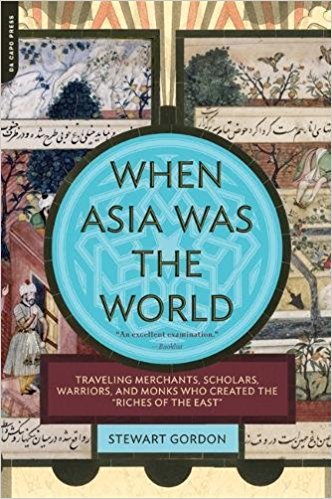
For the best part of 1000 years, Asia was the heartbeat of this planet. The birthplace of civilization, and the masters of innovation. When the Europeans were still acting like cavemen, the Arabs were discovering the roots of modern medicine. While South and North America barely had recorded history, the silk road was the path in which riches flowed all over. While Europe dreamed of a grand future, men from the desert made their way around the world. This is a review of a book, that told these stories, and analyzed these events. From a period of time, often forgot about in the West, that is of course When Asia Was the World.
Written by Stewart Gordon, the book is split into 10 chapters, and each chapter represents, an idea or specific person that defined the era it lived in. They are chronological in their path, and try to describe the years between 500-1500 CE with background detail, and why that specific person defined that part of the thousand years. It begins by telling the story of Xuanzang, and why he was a key factor, in allowing the continent to not descend into endless war. He was a Chinese Buddhist Monk and eventually became the linchpin in linking Indian and Chinese Buddhism together as the book describes. It talks about how he was sent on diplomatic trips to calm any tensions and build the silk road into one that allowed no borders. We then see that the following couple of chapters show the strength of the emerging Muslim empire and how it was beginning to interact with Chinese and Indian dynasties. It tells it through the stories of Ibn Fadlan and Ibn Sina, one a traveler who created a new path for the Silk Road into Eastern Europe and one a physician whose methods are still studied about to this day. This sets up the beginning of the domineering period and establishes the powers of China, India and the Muslims.
Gordon then proceeds to talk about men such as Abraham bin Yiju, Ibn Battuta and Ma Huan who defined the economic development of the empire with trade along the Indian ocean, as well trade through Persia, and Eastern Russia. These men, with the use of travel, and natural resources such as spices led to many rich kings, as well hundreds of thousands of well educated civilians. Asia didn’t need to trade with anyone else and became the ultimate area for profit in the world. However after this period, towards the time of the Mongol Empire we start to see the decline of the continent, as bloodshed not gold becomes the priority. Maintaining power through force was more important than institutions that stood for centuries such as the Library of Baghdad. This is summed up through the story of Babur, the man who began the Mughal dynasty who valued gunpowder hire than anything else. This as the author describes eventually leads to the slow decline of Asia, as while great empires are still maintained. They are not ones based off of building economically, or through the arts and sciences, but ones that simply wish to gain land and maintain power like the Ottomans, Safavids or Mughal.
The style of the author Stewart Gordon is an interesting one, as he seems to have an underlying, cynical tone as while praising Asia, he is obviously disappointed in the attitude many Europeans, and Westerns and generally feel about the East. Many do not recognize the accomplishments of the Asian continent. This comes out in an amusing way in his writing, as quite often he is sarcastic, or pokes fun at this line of thinking. You also see him do this for the way many kings, and disciples acted in this time, however you recognize there is a clear respect for the Asian culture, and he tries to reflect the thought process, and political backgrounds of peoples line of reasoning at the time. He is successful in general in doing this, however of course being from a Western background himself, it would be almost impossible to completely capture the feelings of any Asian writer, be he was from Iraq, or Japan.
One thing that Gordon does very well, is that he understands who his likely audience is and connects them very well to their more likely understandings. As he is publishing the book in the West, he attempts to compare the grand capitals of Baghdad, Mumbai, Kaiefing, etc. to the grand cities of New York, London and Paris. As great trading points, as well as centers of cultural and political thought. The idea of the book, is to try and get someone who is unfamiliar of Asian history at this point, and try to explain to that person in simple, yet effective terms how the world operated and how Asia was the center of it for so long, and this I think it something the author achieves well.
Overall my opinion was that it was a very entertaining book to digest, as while I consider my knowledge of history to be fairly under grasps, there is always stories, or big gaps that can be filled by interesting information, as its represented here. If I had to give a rating for the book I would give it a solid 9/10, because of its ability to understand its reader, and then tell an effective story through the eyes of specific people, who represent ideas bigger than themselves.
